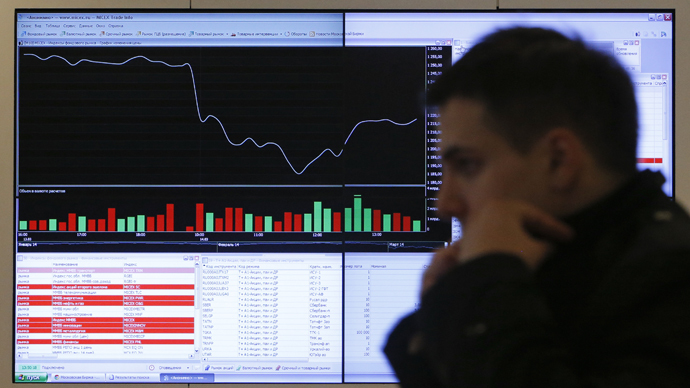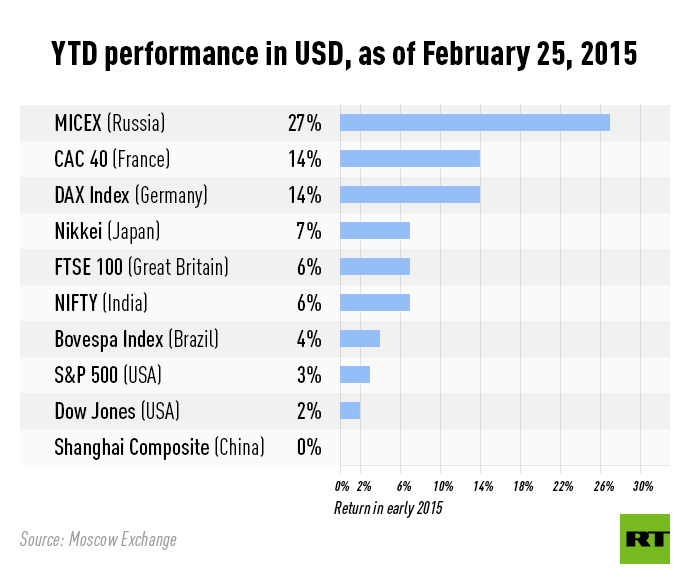Russia’s MICEX this year’s best performing stock index

The Russian ruble-denominated MICEX is currently the best performing index this year, with analysts expecting the growth streak to continue, despite rating downgrades, Western sanctions and the plunge in the oil price.
The MICEX has added 27 percent since the start of the year, outperforming some of the leading indices in Germany, France and Japan, Moscow Exchange confirmed in an e-mail to RT.

Russian analysts expect the growth to continue during the year. Aleksey Astapov of asset managers Arsagera expects the MICEX to hit 2,100 by the end of 2015, a huge jump from Thursday’s reading of 1,750. It’s close to the 2011 high, and a further rise could drive the index to its highest level since 2008.
The Moscow Exchange hasn’t given a forecast but said 2014 market volatility was largely spurred by oil prices and geopolitics, and that forced many foreign investors who had quit Russian stocks to change their attitude to the market in the second half of 2014 and the start of 2015.
“Our data shows that in the beginning of 2015 the overall net purchases of Russian shares by foreign investors were above $656 million (40 billion rubles),” Moscow Exchange said.
An expectation of corporate revenues in Russia is a key factor for index growth, according to Astapov. A combination of a weaker ruble, import substitution and the state support for some industries makes investors believe Russian firms would produce robust results, he said.
‘Black Tuesday’ that shook the Russian market and the currency in mid-December was just one single ‘episode’, according to Ivan Tchakarov, a chief economist at Citibank Russia, while investors need to take a broader, more impassionate view.
READ MORE: Ruble plummets losing more than 20% in a day, hitting new dollar and euro lows
“Russian market suffered a lot last year, which led investors to lose interest, but now there are hopes that geopolitics are looking a bit better, so there are some investors trying to come back selectively and from very low levels,” Tchakarov told RT.
Western pressure and prospects
The downgrade on the Russian economy to non-investment grade by the two global rating agencies S&P and Moody’s were largely anticipated, and the effect on the Russian market will be limited, analysts agree.
“There were expectations building up that Russia will be downgraded to junk. That's how we can justify the effect that the Russian market has strengthened at the beginning of the year exactly the time when we have downgrades to junk,” Tchakarov said.
READ MORE: Russia’s downgrade by Moody’s ‘exorbitantly negative, politically motivated’ – finance minister
“Our personal view is that S&P and Moody’s have an unnecessarily bearish view on the Russian economy that led them to thinking about downgrades. We don’t disagree that it will be a difficult year for the Russian economy - quite the opposite - we also expect a recession, but we do not think it will be as deep and as painful as it is anticipated by Moody’s. This is the reason why we still think that Russia deserves to be at Investment grade status,” Tchakarov said.
Sober-minded investors are skeptical about the data that the rating agencies release, and consider them to be ‘politicized’, Astapov wrote Russia Today in an e-mail.
The Western sanctions against Russia that have already hit both sides are in fact good for Russia, Astapov said.
“… we think, it [the sanctions – Ed.] is a good challenge for the Russian economy and a good reason to start the escalated economic reforms oriented at domestic resources,” he said.












